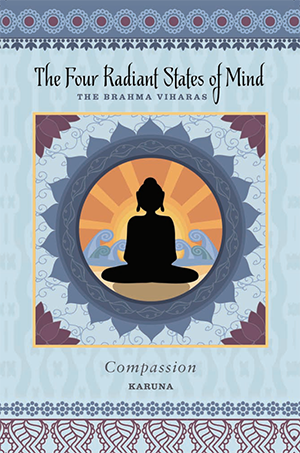Compassion (Karuna) is one of the deepest and most powerful qualities of The Four Radiant States of Mind (Brahma Viharas) and it is a quality that we can develop more deeply to be with those we love dearly, those we don’t really know at all, and with all of humanity as we face the many challenges that life brings.
I have a friend who is slowly loosing her husband to cancer. When I think of her my heart goes out. Literally, I can feel my heart soften and become tender when I feel her pain. Because, I have walked in her shoes.
So many times we are uncertain of how to respond or what to do in the face of someone else’s pain. We all have different responses based on how we have been conditioned through our families, communities or faith traditions. Sometimes we find ourselves turning away, other times we recognize sadness and feel a stirring but move on, and other times we reach out and offer words of encouragement or some sort of help.
There have been many times when I have been in the city of San Francisco and see homeless people, and I can feel right away my heart aches for what their life might be like—the agony of living outside in the elements, the fear of being hurt, the pain of being unseen or abandoned, living with a disability or a mental illness without aid or medication. Earlier in my life I may have I looked away or passed people by when I encountered homelessness, it was my conditioning not to really look. I used to be embarrassed or ashamed by this because I have so much in my life.
But through my practice, I have found myself turning towards the suffering I see in the world and in others. I allow the compassion that I feel deep in my heart to rise up and I imagine the homeless people I encounter and practice Tonglen. I was introduced to Tonglen (literally meaning ‘giving and taking’ practice years ago by my Tibetan teacher and find it very practical and supportive.
Tonglen is simple – we turn towards the suffering of another and feel the pain and sadness of their lives as we perceive it and breathe it in. Yes, breath in the fear, the pain, the confusion, the uncertainty and the loneliness. We allow our hearts to, recognize this suffering, to acknowledge this suffering. Then very gently we breathe out love, kindness, compassion, good will, peace, ease or whatever wholesome qualities come to mind. Obviously this doesn’t change the situation, but an offer, even if only mentally creates a calm mind and equanimous heart.
Taking it a little further to those that are close to me – friends and people that are known to me that are going through difficult times I make a point to reach out. Sometimes with a short email, a text, a call or message where I convey that “I care about you,” “I know this is a difficult time for you right now,” “I am holding you in my heart with thoughts of peace, freedom and tenderness,” “may you find ease and peace in the quiet moments . . . finding a way to live with uncertainty and not knowing what lies ahead”.
Compassion isn’t about fixing something or trying to make it better. It’s about acknowledging what is real or present an accepting that this is the way it is right now. There is nothing to do or change.
Turning towards compassion nurtures this quality of open-hearted tenderness and inclines the mind and heart to open and grow wide and expansive, recognizing that we have a capacity to grow and expand and be with whatever presents itself without turning away happiness and well-being.

